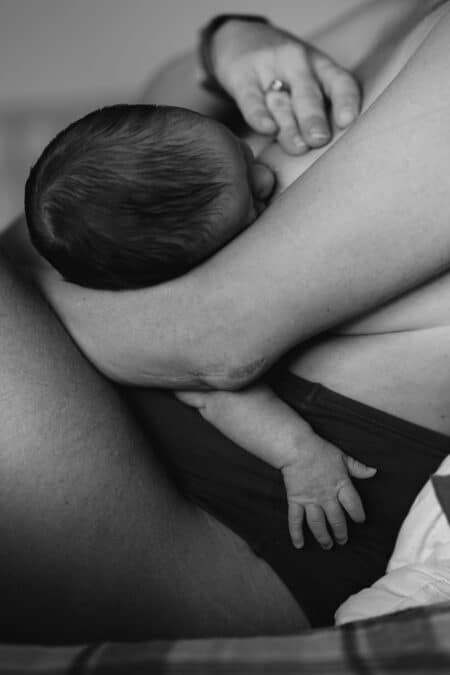
A baby needs to be fed regularly. This is obvious. But the rhythm will depend above all on the child. And very often, even if you have decided not to let your baby lead you by the nose, you will see that you will quickly adapt to his demands. You will also see that you will ask yourself a lot of questions: Does he suckle too little or too much? Does he have a normal rhythm?
What is a normal rhythm?
As soon as you’re back home, you’ll find yourself alone (or almost alone) with this little fellow. Everything you learned in the maternity ward will fade away and you’ll have to figure out how to satisfy him on your own. You’ve been able to spot the signs that he’s hungry, and at least you remember that. So you respond to each request and then you start to tire and count the number of feedings your baby wants.
In general, a baby will nurse 8 times a day for the first few weeks. If this is the case, everything is fine. Your baby will grow at his own pace. You may find that the timing of feedings varies. Some days he may be hungrier than others. Don’t worry, this is normal. Just like an adult, your baby may be satisfied more or less quickly.
You should ask yourself if your baby doesn’t want to feed at least every 5 hours. On the other hand, is your little guy or gal a real glutton? And that worries you?
Let’s see if the baby can suckle too much.
Do you have a little ogre at home?
Does your baby demand more than 10 feedings a day (sometimes up to 15)? The greedy one! But don’t worry. Your child is growing and needs to eat. Some brats more than others. Many young mothers are confronted with cluster feedings, a perfectly normal phenomenon that nevertheless worries them.

What is it? The baby will call for the breast to suckle several times in succession. He can thus suckle during several hours (one has the impression that he does not stop). It is especially observable in the evening. This phenomenon is called cluster feeding. This happens especially during the growth phases of the child, that is to say during the 3, 6 and 9 weeks after giving birth. You’ll feel like you’re spending your days feeding your baby. This is completely natural and your baby will not drown in your milk! (This is an image of course, calm down!).
One thing should be made clear immediately: even if baby eats a lot, he can never eat too much. If he asks you to eat, it is because he needs it. The figures that you can find on the different websites you will inevitably visit only give an average. They can’t really know the needs of your child in particular.
To reassure yourself, consider checking his weight gain. You’ll see that his weight curve is usually quite normal, even if he’s suckling a lot. A baby who is gaining weight is healthy first. You can imagine how worried you’d be if he wasn’t gaining weight and sucking!
A baby will double his weight between the 4th and 6th month and triple it until the 12th month.
You have to trust your baby. If he asks to suckle, it is because he needs to. The fact that baby is growing faster than he is growing is perfectly normal.
Again, baby will spend between 10 and 60 minutes at the breast at each feeding.
Is my baby sucking too much?
Many moms have asked themselves this question. And the answer is very simple: no. A baby will never overeat when he or she feeds. You can try to breastfeed your baby. If he doesn’t need it, he won’t breastfeed. A young mother’s milk production is ideally matched to her baby’s needs. If your baby is demanding a lot of feeds, it’s simply because he needs them. Every baby has a different need, and if your family or friends make comments about the number of feedings, don’t worry.
However, if you notice that your baby is staying on the breast for a long time without sucking, consult a specialist. He may be stressed.

